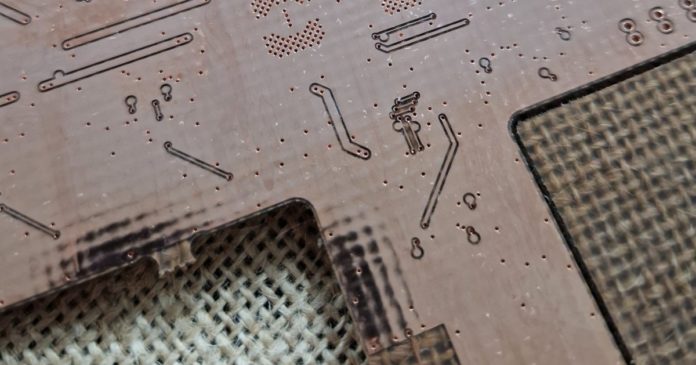A UK university and an innovator providing sustainable solutions to the e-waste stream have teamed up to further develop a natural fibre-based circuit board.
According to Jiva Materials, printed circuit board (PCB) manufacture commonly forms the largest share of the overall carbon footprint for an assembled electronic product. The Hampshire based company has developed what it says is the world’s first fully recyclable rigid PVC laminate – Soluboard.
The alternative is made by impregnating natural fibres with a water soluble and halogen-free flame retardant, also making the recovery of electronic components containing valuable materials more environmentally friendly.
While water-soluble, Soluboard will only break down when immersed in hot water for a sustained period. Jiva says it’s fully compatible with existing processes such as acid/alkaline etching, electroplating, drilling, routing and curing, and Soluboard based PCBs are assembled using low-temperature solder.
In 2019, Jiva Materials and its partner at the time won the JEC Asia Innovation Award in the Electrical, Electronics and Appliances category for their development of Soluboard composites, which were flax- based at that point.
In ongoing R&D, the company is refining its products and investigating other potential materials including hemp. Very recently, Jiva and the University of Portsmouth were awarded a Knowledge Transfer Partnership (KTP) by Innovate UK to further develop and commercialise Soluboard.
Jiva will be working with researchers from the University’s School of Mechanical and Design Engineering, who will put other natural fibres such as jute and hemp through their paces for use as potential laminate materials.
“This partnership aligns with our vision of reducing the environmental impact of electronic devices, Jiva has been at the forefront of creating materials that are both sustainable and functional,” said the company’s CEO, Dr Jonathan Swanston. “The University’s expertise in developing natural fibre laminates make them the perfect partner for Jiva.”
Professor Hom Dhakal, from the University of Portsmouth and academic lead for the project, says the partnership will make a significant contribution towards delivering more sustainable materials and increased “circularity” in the sector.
“This collaborative KTP project with Jiva Materials, wonderfully suits a mutually prioritised goal of working together towards achieving a sustainability agenda,” he stated.


